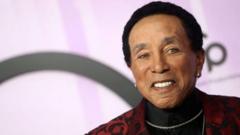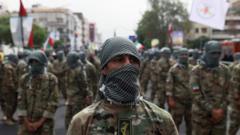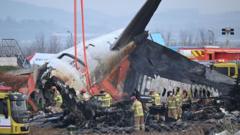Han Tae-soon, who spent decades searching for her daughter Kyung-ha, reunited with her only to learn that she had been kidnapped and adopted illegally in the US. Now, Han is suing the South Korean government for neglect in child welfare, a case emblematic of deeper issues within the country's controversial adoption practices.
A Mother's Long Search: South Korean Woman Sues Government Over Kidnapped Daughter

A Mother's Long Search: South Korean Woman Sues Government Over Kidnapped Daughter
After 44 years apart, Han Tae-soon is seeking justice against the South Korean government for its role in the illegal adoption of her daughter, raising broader questions about historic child trafficking.
In May 1975, Han Tae-soon left her home in Seoul without realizing it would mark the last time she would see her young daughter Kyung-ha for over 44 years. "I was going to the market and asked Kyung-ha, 'Aren't you coming?' But she told me, 'No, I'm going to play with my friends,'" recalled Ms. Han. When she returned home, Kyung-ha had vanished. The two would eventually reunite, but by then, Kyung-ha had become Laurie Bender, a middle-aged woman living in California.
In the wake of their reunion, Ms. Han is now suing the South Korean government for failing to protect her daughter from being abducted, being one of many parents alleging systemic issues related to illegal adoptions in South Korea's overseas adoption program. More than 170,000 children have been sent abroad for adoption since the program's inception in the 1950s, with many cases featuring allegations of fraud, kidnapping, and human trafficking.
A landmark inquiry earlier this year revealed that various South Korean governments committed human rights violations by permitting private agencies to conduct adoptions with little oversight, creating conditions for abuse and exploitation. Ms. Han's lawsuit, set for next month, is significant as she’s the first biological parent to seek damages from the government, joining a man who was adopted in the US in being the first adoptee to file a lawsuit.
"The emotional pain that individuals and families have experienced is understood," a spokesperson for the government stated, expressing regret for the suffering caused. Yet, Ms. Han feels neglected, asserting she has received no apology for the long ordeal she endured searching for her daughter.
After years of futile efforts involving flyers, police visits, and television appeals, a breakthrough came in 2019 when Ms. Han registered with 325 Kamra, a group dedicated to connecting Korean adoptees with their birth parents using DNA matching. Their connection led to a tearful reunion at Seoul's airport, where Ms. Han immediately recognized her daughter through her hair, a skill honed from her 30 years as a hairdresser.
Kyung-ha, then six, had been around her home when a woman claiming to know Ms. Han took her away. As an adoptive child in America, Kyung-ha faced her sense of identity being stripped away, as she learned her background was built on falsified documents that indicated she was an orphan.
South Korea's overseas adoption program began after the Korean War, initially seen as a humanitarian effort in a nation struggling with poverty and a multitude of orphaned children. However, over the years, the separate interests of private adoption agencies led to unethical practices, including abductions and falsified records.
As a result of inadequate government oversight, allegations of mass-abduction surfaced, and Ms. Han’s case is part of an ongoing challenge to confront these historic injustices. While the government claims to be working towards improvements in transparency and ethical standards in adoptions, the ongoing trauma for adopted individuals and their biological families highlights the lingering repercussions of these past actions.
Despite their reunion, Ms. Han and Kyung-ha find communication difficult, as they are separated by language and geography, and Ms. Han's yearning for a meaningful connection remains unfulfilled. "Even though I have found my daughter, it doesn't feel like I've truly found her," she expressed, affirming that no compensation is adequate for the emotional and physical toll the years of separation caused.
In the wake of their reunion, Ms. Han is now suing the South Korean government for failing to protect her daughter from being abducted, being one of many parents alleging systemic issues related to illegal adoptions in South Korea's overseas adoption program. More than 170,000 children have been sent abroad for adoption since the program's inception in the 1950s, with many cases featuring allegations of fraud, kidnapping, and human trafficking.
A landmark inquiry earlier this year revealed that various South Korean governments committed human rights violations by permitting private agencies to conduct adoptions with little oversight, creating conditions for abuse and exploitation. Ms. Han's lawsuit, set for next month, is significant as she’s the first biological parent to seek damages from the government, joining a man who was adopted in the US in being the first adoptee to file a lawsuit.
"The emotional pain that individuals and families have experienced is understood," a spokesperson for the government stated, expressing regret for the suffering caused. Yet, Ms. Han feels neglected, asserting she has received no apology for the long ordeal she endured searching for her daughter.
After years of futile efforts involving flyers, police visits, and television appeals, a breakthrough came in 2019 when Ms. Han registered with 325 Kamra, a group dedicated to connecting Korean adoptees with their birth parents using DNA matching. Their connection led to a tearful reunion at Seoul's airport, where Ms. Han immediately recognized her daughter through her hair, a skill honed from her 30 years as a hairdresser.
Kyung-ha, then six, had been around her home when a woman claiming to know Ms. Han took her away. As an adoptive child in America, Kyung-ha faced her sense of identity being stripped away, as she learned her background was built on falsified documents that indicated she was an orphan.
South Korea's overseas adoption program began after the Korean War, initially seen as a humanitarian effort in a nation struggling with poverty and a multitude of orphaned children. However, over the years, the separate interests of private adoption agencies led to unethical practices, including abductions and falsified records.
As a result of inadequate government oversight, allegations of mass-abduction surfaced, and Ms. Han’s case is part of an ongoing challenge to confront these historic injustices. While the government claims to be working towards improvements in transparency and ethical standards in adoptions, the ongoing trauma for adopted individuals and their biological families highlights the lingering repercussions of these past actions.
Despite their reunion, Ms. Han and Kyung-ha find communication difficult, as they are separated by language and geography, and Ms. Han's yearning for a meaningful connection remains unfulfilled. "Even though I have found my daughter, it doesn't feel like I've truly found her," she expressed, affirming that no compensation is adequate for the emotional and physical toll the years of separation caused.



















